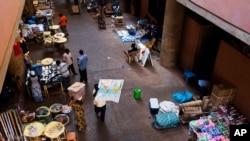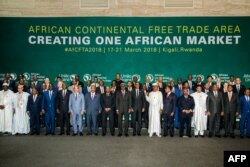The African continental free trade agreement went into effect Thursday, with 24 of 54 countries ratifying it.
The plan was signed at the African Union summit in Kigali in 2016, after four years of negotiations, with Burkina Faso being the latest country to join.
The agreement aims to facilitate the free movement of goods and people across the continent.
Charles Kahuthu, head of the East African Chamber of Commerce, Industry, and Agriculture, says African countries trading among themselves will benefit the continent.
"Africa continental free trade area, if we use that framework to increase or boost intra-Africa trade, would mean value addition for our raw materials," he said. "Those natural resources we have an abundance of instead of exporting them in raw form, we shall use the demand in the continent to be able to process them in a manner that our own consumers within Africa can use."
With imported goods flooding the African market from Asia, some African countries are implementing mechanisms and laws to protect their farmers and industries.
"Our infrastructure is outward looking," said Fred Muhunza, who teaches economics at the University of Makerere in Kampala. "We do not have transport byways of roads, airport and air travel that link Africa with Africa for purposes of trade. A lot of trade is looking beyond Africa, outside Africa."
Also, African countries have been looking at measures to block other goods, he added.
"We have a number of local laws that are coming against foreign free trade which is going to be detailed. We also have standards, much of African countries don't have a common standard. So a country decides to use non-tariff measures may have to decide and say your standard is not good, so that is not going to go through," Muhunza said.
Thirty African countries have yet to sign the continent's trade agreement. Signatories have until July to find ways to make the deal work.





